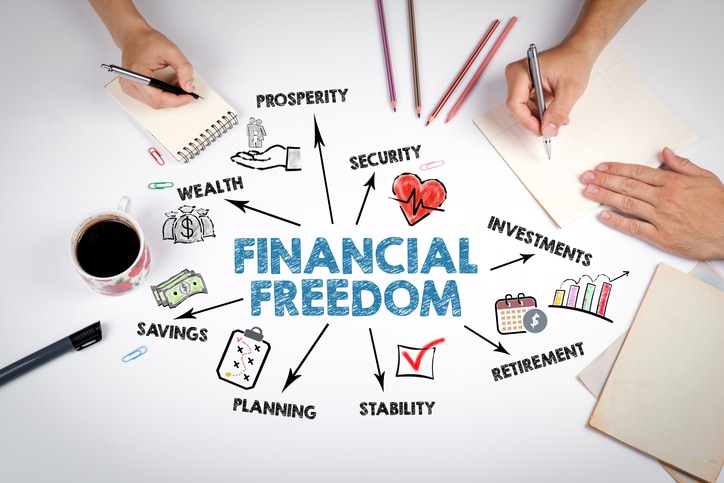The true meaning of financial independence is different for everyone. For some people, financial independence is the ability to buy a house, or to support oneself in retirement. For others, it’s the ability to transfer wealth to children or grandchildren. In its broadest sense, financial independence means accruing sufficient assets to support the lifestyle you envision for you and your loved ones, both now and in the future.
Whatever financial independence means to you, it’s worth taking the time to evaluate your success on a regular basis, and to formulate next steps towards financial freedom. SageVest Wealth Management offers 8 tips to help you achieve financial independence and success.
1) Understand Your Earnings Are Not Wealth
There are plenty of people with lofty incomes. However, an income doesn’t equate to wealth unless you save some of it and build upon it.
Many high income earners surprisingly have very little in savings relative to their income, because they choose to live an affluent lifestyle now rather than saving for the future. To achieve long-term financial independence, the first thing you need to do is understand that your income needs to support today as well as tomorrow. You need to save for the long-term and to do that, you need to spend less than you earn.
2) Ignore the Joneses
One of the best pieces of advice is to ignore the lifestyle of others and focus on what’s important to you. Don’t get caught up in competing. Instead, live your own life, and make sure it’s a life you can afford, both now and in the long run.
If you have friends who only care about material items, remember that true friends respect you and care about you, regardless of which restaurant you eat at or where you shop. Furthermore, if you receive comments about your more modest lifestyle, you can always state the truth, that you care more about achieving financial versus material wealth.
3) Invest for the Long-Term
Committing your savings to long-term growth helps your wealth to build, compound, and ultimately reach your objectives. SageVest works with clients to develop appropriate long-term investment strategies and manage portfolios in accordance with your individual objectives.
4) Know Your Number
To achieve financial independence, you need to start saving for the future – but do you know how much to save, or if you’re on target?
Most people simply save what they feel they can and then hope for the best, without a plan. That’s like setting off on a cross-country trip without directions! You need a financial map to plan for your future, including retirement. Reviewing planning projections and knowing how much you need to retire (among other life objectives) help you to set goals, make smart money decisions, and create realistic expectations. SageVest embeds financial and retirement planning as part of our ongoing services, giving our clients the advice they need to succeed.
5) Pay Yourself First
A great way to avoid spending too much is to pay yourself first. The smartest and easiest way to do this is automating your saving. The best methods include:
- Automatic contributions to your employer retirement plan.
- Automatic payroll direct deposits into an investment account.
- Automatic and recurring ACH transfers from your bank account to your investment account.
If you receive a bonus or commissions, more diligence is needed. In such instances, it’s important to determine a percentage that should be saved, and to immediately deposit and invest that amount.
6) Avoid Debt
Debt is the antithesis of wealth. Many people have a mortgage, but consumer debt (e.g. credit card debt) should be avoided, except for balances that you can clear at the end of each month. Our general motto is that if you don’t have the money to afford something, then don’t buy it.
Another common debt go-to is home equity loans (HELOCs). Unless a home repair is necessary to avoid damage to your home, you should carefully evaluate debt acquisition, relative to your long-term life goals.
7) Create a Safety Net
Too few Americans have an adequate financial safety net, yet an emergency fund can help cope with surprise expenses like car maintenance, home repairs, or health expenses. Having an emergency fund is one of the best ways to avoid debt.
We recommend holding at least three months of spending needs in your checking or savings account (not invested in the markets). This amount should be even greater (at least six months of earnings) if you’re the sole breadwinner or if there’s uncertainty about your job security.
8) Focus on Advancing Your Career
In addition to saving and investing in your portfolio, increasing your income can help you attain financial security. Investing in your career can distinctly correlate with achieving your wealth objectives – as long as you capture the additional earnings as they increase.
SageVest Wealth Management understands the importance of blending financial planning and investment management into every wealth management relationship. We help you to define your financial objectives and to create workable financial solutions to achieve your goals. Please contact us if you’d like to talk about securing your own financial independence and success today.




